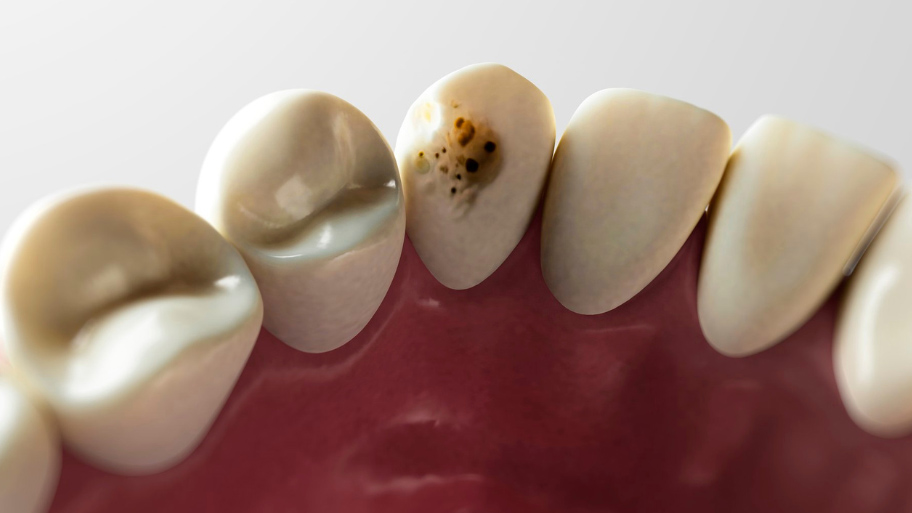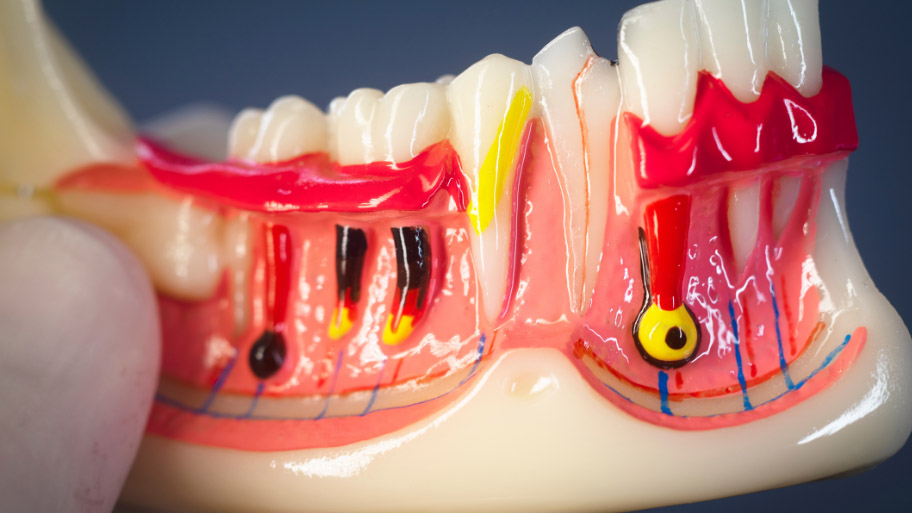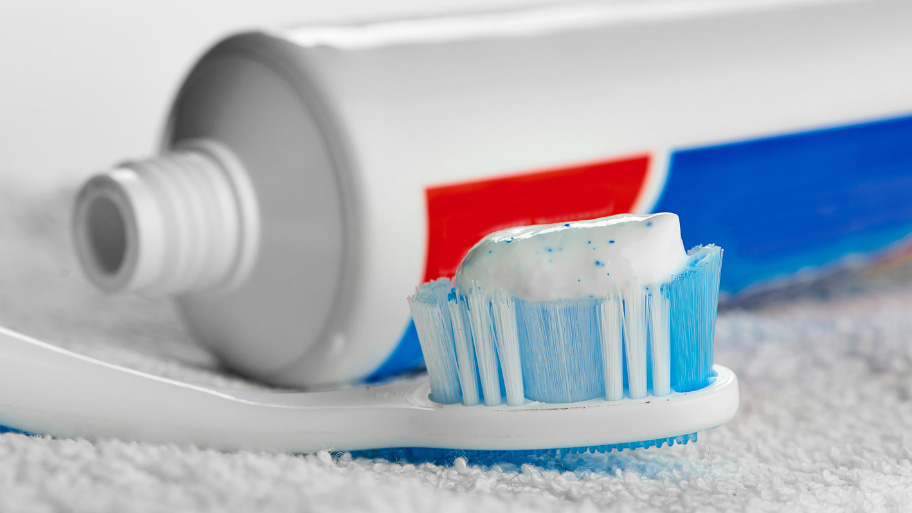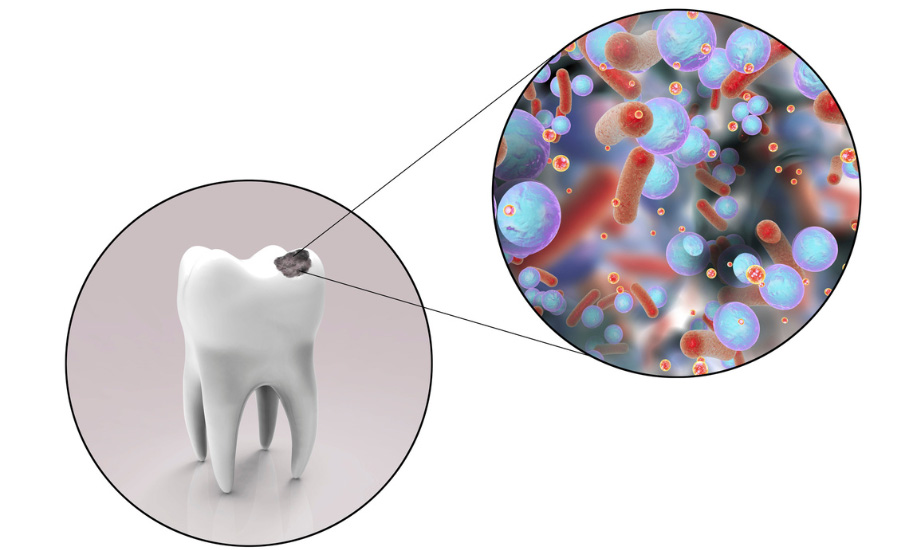How Do I Prevent Tooth Decay?
Tooth decay, a common yet preventable dental issue, primarily affects the tooth’s enamel and dentin, the layers that safeguard our smiles. It begins when the remnants of carbohydrate-rich foods, such as sugary snacks, fruits, or even bread, linger on our teeth.
When carbohydrates from our diet, such as sugars and starches, remain on our teeth, they set the stage for tooth decay. This happens as oral bacteria metabolize these carbs, producing acids in the process.
These acids, combined with saliva, food particles, and bacteria, form a sticky substance called plaque. This plaque clings to the teeth, and its acidic nature begins to wear down the tooth’s protective enamel, gradually leading to the formation of cavities – the telltale signs of tooth decay.
Comprehensive Dental Care for Tooth Decay Prevention
Achieving and maintaining dental health involves a multifaceted approach. Here are some key practices to consider:
- Diligent Brushing and Flossing Habits: Make it a habit to brush your teeth using fluoride toothpaste at least twice each day and to floss once daily. This routine is essential in combating plaque buildup and preventing the formation of tartar.
- Selective Eating Choices: Shift towards a diet that minimizes exposure to excessive sugars and acids. Embrace foods that are allies to your oral health, such as those rich in calcium and vitamin D, to fortify your teeth.
- Prioritizing Regular Dental Visits: Establishing a routine of visiting your dentist for checkups and cleanings, typically recommended every six months, plays a pivotal role in the early spotting and management of dental issues.
- Fluoride as a Dental Ally: Incorporate fluoride-enhanced dental care products, like specific toothpastes and mouth rinses, into your oral hygiene regimen. Fluoride is known for its enamel-strengthening properties and its effectiveness in decay prevention.
- Proactive Measures for Kids' Teeth: For younger family members, consider the application of dental sealants on their molars. These sealants act as a shield, protecting the teeth from cavity-causing bacteria and food particles.
Incorporating these practices into your daily life is a proactive step towards safeguarding your dental health. By embracing these habits, you can effectively lower the risk of tooth decay and ensure the enduring vitality of your smile.
Regular Dental Check-Ups
Emphasizing the value of consistent dental visits is crucial. These check-ups go beyond basic cleaning; they are pivotal moments for early detection of dental issues, including the onset of cavities.
During these visits, dentists not only address current dental concerns but also provide tailored guidance on how to optimize your oral care routine, ensuring your efforts at home are as effective as they can be.
Daily Oral Hygiene Practices
Establishing and adhering to a comprehensive daily oral hygiene regimen is fundamental in the fight against tooth decay. Effective oral care involves more than the standard twice-a-day brushing.
It includes diligent flossing to eliminate hidden plaque and food remnants in areas your brush may miss.
Integrating a fluoride-rich toothpaste and an antibacterial mouthwash into your routine can significantly bolster your oral defense. Consistently practicing these steps is the bedrock of maintaining enduring dental health.
Understanding Tooth Decay

Tooth decay is not just a surface-level problem; it’s a complex condition that can have far-reaching effects on overall dental health. At its core, tooth decay is a bacterial infection that can compromise the integrity of the tooth and, if untreated, lead to more serious conditions.
The process of decay begins microscopically. The enamel, though the hardest substance in the human body, is not impervious. Microscopic pits and fissures on the enamel surface can harbor bacterial colonies. When these bacteria metabolize sugars from our diet, they produce acid that gradually erodes the enamel. This erosion can create tiny openings in the enamel, providing a pathway for bacteria to reach the more vulnerable dentin layer beneath.

The journey of tooth decay from the hard enamel to the softer dentin is a pivotal phase in dental health. Dentin, being more porous and less dense than enamel, is more vulnerable to bacterial invasion and acid damage.
This vulnerability accelerates the decay process within the tooth. When decay penetrates through to the inner pulp, which houses nerves and blood vessels, it can result in discomforts like toothaches, increased sensitivity, and in severe cases, lead to the formation of abscesses.
Grasping the progression of tooth decay is vital for timely and effective dental care. It goes beyond merely filling cavities; it’s about intercepting the decay at its nascent stage to preserve the tooth’s structure and ensure its longevity.
This proactive approach is key to maintaining not just the health of individual teeth, but overall oral wellness.
Early Signs and Symptoms of Tooth Decay
Identifying tooth decay in its early stages is key to preventing more serious dental issues. Here are some signs to watch out for:
- Tooth Sensitivity: A sudden or gradual increase in sensitivity to hot, cold, sweet, or acidic foods and drinks can be an early indicator of enamel erosion.
- Visible Discoloration or Spots: Look for white, brown, or black spots on your teeth. White spots often signify enamel demineralization, while darker spots may indicate a developing cavity.
- Occasional Tooth Discomfort: Experiencing discomfort or a mild ache in your teeth, particularly after eating sweet, hot, or cold foods, can be an early warning of decay.
- Persistent Halitosis or Altered Taste: Ongoing issues with bad breath or a consistent unusual taste in your mouth, despite good oral hygiene, may be linked to the presence of decay-causing bacteria.
- Change in Tooth Texture: If you detect a tooth surface that feels unusually rough or gritty, this could indicate a loss of enamel minerals, a precursor to decay.
Should you encounter any of these indicators, it’s prudent to schedule a dental examination. Catching tooth decay early is crucial; prompt intervention can halt its progression and potentially avert more invasive dental treatments.
Diet and Tooth Decay

Exploring the intricate link between what we eat and our dental health reveals much about tooth decay prevention. Our daily diet doesn’t just nourish us; it also interacts with our oral environment.
Foods high in sugars and acids unwittingly feed the bacteria that lead to tooth decay. These bacteria metabolize these elements, producing acids that erode the protective enamel of our teeth, a primary factor in cavity formation.
Conversely, embracing a diet that includes nutrient-dense foods provides the necessary building blocks for strong teeth, playing a pivotal role in maintaining dental resilience and health.
Foods to Avoid
For healthier teeth, it’s essential to be cautious about certain types of food. Items laden with sugar, such as confectioneries, sodas, and sugary cereals, are known to fuel the bacteria responsible for tooth decay.
Acidic foods, including citrus fruits and vinegar-based dressings, can weaken and erode enamel over time.
Starchy snacks, which can break down into sugars in the mouth, also pose a risk by sticking to and between teeth, creating a breeding ground for bacteria.
Tooth-Healthy Foods and Drinks
A diet that favors dental health includes foods that strengthen and protect your teeth. Calcium-rich choices, like dairy, broccoli, and fortified plant-based milks, are excellent for reinforcing enamel.
Foods that encourage saliva production, such as crunchy fruits and vegetables, help in naturally cleaning the teeth surfaces. Hydration is key too; drinking water, particularly fluoridated water, aids in washing away residual food particles and bacteria.
Including phosphorus-rich foods like poultry and fish, and vitamin C-rich fruits for gum health, can also contribute positively to your oral hygiene routine.
The Role of Fluoride in Preventing Tooth Decay

Fluoride stands as a formidable defender in oral health, naturally enhancing the resilience of our teeth.
Its primary role is to fortify the enamel, our teeth’s first line of defense, making it tougher against the erosive action of acids from plaque and sugars. More than just a shield, fluoride actively repairs minor early decay before it progresses into a cavity.
Regular use of fluoride-enriched toothpaste and drinking fluoridated water are simple yet effective ways to harness this mineral’s protective power, keeping our teeth robust and cavity-resistant.
Advanced Treatments and Solutions for Tooth Decay
In the realm of dental care, innovative treatments for tooth decay have transformed patient experiences.
Modern dentistry offers a spectrum of solutions, from minimally invasive fillings to more comprehensive options like inlays, onlays, and crowns, tailored to preserve natural tooth structure.
For advanced decay, treatments such as root canals and implants are pivotal, ensuring that even severely affected teeth can be saved or aesthetically replaced, maintaining both functionality and oral health.
Innovative Dental Technologies
Recent advancements in dental technology are revolutionizing how we approach oral health care.
Digital dentistry, including 3D imaging, allows for precise diagnosis and customized treatment plans. Laser technology in cavity treatment and gum care provides a less invasive, more comfortable patient experience.
Furthermore, the development of new biocompatible materials for fillings and restorations is enhancing the durability and compatibility of dental treatments.
Myths and Misconceptions about Tooth Decay
Tooth decay is often shrouded in myths that can lead to confusion about proper dental care.
One common misconception is that sugar is the sole cause of cavities. While sugar plays a role, it’s actually the acid produced by bacteria feeding on sugar that leads to decay.
Another myth is that cavities are only a concern for children. In reality, adults are equally at risk, especially with receding gums exposing the roots to plaque.
Understanding these truths is vital for effective dental care.
Frequently Asked Questions (FAQs)
Answer: Our teeth are protected by a strong outer layer of tooth enamel. A cavity can form once bacteria bypasses this layer, typically as a result pf injury o the tooth or simply poor oral hygiene. Once bacteria reach the layers of dentin beneath the enamel, the cavity can form will continue to grow worse until treated.
Answer: Patients may initially notice tooth sensitivity to hot or cold temperatures, as well as toothaches that don’t subside after 48 hours. If you have pain in your tooth, then see your dentist right away. We can perform a diagnosis to see if you require treatment or not.
Answer: Remember, the decay only grows worse, eventually allowing bacteria to come into contact with the inner pulp, where an infection or abscess can form. The tooth will then require a root canal and if not treated in a timely manner, could need to be removed to prevent the spread of infection to surrounding teeth or into the jawbone itself.
Answer: First, remember that foods and drinks high in sugar and promote cavities, so try cutting back. We also recommend brushing your teeth twice a day and making sure your floss thoroughly before going to bed. You also need to have your teeth examined and cleaned once every six months. If you have any questions about avoiding tooth decay then please contact our team today.
Get Expert Dental Care at Dimples Dental
At Dimples Dental, we pride ourselves on delivering exceptional dental services with a personal touch. Our skilled team combines their deep expertise with the latest in dental technology to offer comprehensive care tailored to each individual.
From preventive maintenance to cutting-edge treatments and aesthetic dentistry, we are committed to enhancing and preserving your oral health. Choose Dimples Dental for a dental experience that prioritizes not just your teeth, but your overall health and happiness. Join us on a journey to brighter smiles and healthier lives.


ABOUT THE AUTHOR
Dr. Roos was raised in West Des Moines, IA. He attended Valley High School and went to college at Luther College in Decorah, IA. He graduated from the University of Iowa College of Dentistry in 2004. He has attended numerous post-graduate courses in endodontics and orthodontics. He is a member of the American Dental Association, the Iowa Dental Association, and the American Orthodontic Society.
Dr. Roos is married to his wife Sara and they have 6 children. He enjoys spending time with his wife and children, gardening, landscaping, and farming with his cousin on their family farms in Avoca, IA.
Put Your Dental in Good Hands
I've been seeing Dr. Ethan Roos at Dimples Dentistry for over 5 years and have always been happy with the care I've received here. The staff has always been very welcoming, as if you are part of the family. I highly recommend!!
Called Dimples and wish I called them first. Their receptionist was SO kind and SO helpful. Even offered to call to have my records sent to them in hopes to save me some money from doing x rays again. She was nothing but sweet! Got me scheduled within 2 days. Went above and beyond and was kind when I arrived.
Dr. Roos and his staff are incredibly professional, kind, and knowledgeable. Their pricing is also extremely reasonable, even for those without insurance. We had an excellent experience with a dental emergency exam; they also had availability to fit us in for a routine exam and cleaning after the emergency exam.

